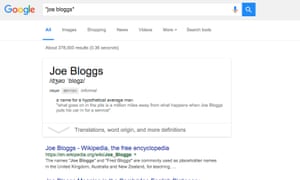Searching with regular sentences will only get you so far – if you need to find something a bit tricky turn to these advanced yet simple methods--转
原文地址:http://www.theguardian.com/technology/2016/jan/15/how-to-use-search-like-a-pro-10-tips-and-tricks-for-google-and-beyond
Search engines are pretty good at finding what you’re looking for these days, but sometimes they still come up short. For those occasions there are a few little known tricks which come in handy.
So here are some tips for better googling (as it’s the most popular search engine) but many will work on other search engines too.
1. Exact phrase

Exact search Photograph: Samuel Gibbs for the Guardian
The simplest and most effective way to search for something specific is to use quote marks around a phrase or name to search for those exact words in that exact order.
For instance, searching for Joe Bloggs will show results with both Joe and Bloggs but not necessarily placed sequentially. Searching for “Joe Bloggs” will surface only those that specifically have the name Joe Bloggs somewhere on the page.
The exact or explicit phrase search is very useful for excluding more common but less relevant results.
2. Exclude terms

“Joe Bloggs” -jeans Photograph: Samuel Gibbs for the Guardian
If exact phrase doesn’t get you what you need, you can specifically exclude certain words using the minus symbol.
A search for “Joe Bloggs” -jeans will find results for Joe Bloggs, but it will exclude those results for the Joe Bloggs brand of jeans.
3. Either OR

OR search for things that could be one thing or another, but you don’t need both terms to exist on a single page. Photograph: Samuel Gibbs for the Guardian
Default text searches find results with all the words of the query. By using the OR term you can search for one or another term, not just all the terms. OR searches can be useful for finding things that you’re not sure which term will be used from a known list.
4. Synonym search

Searching using synonyms helps cover all bases. Photograph: Samuel Gibbs for the Guardian
Sometimes it’s useful to search for a less specific term. If you’re not sure which term will be used you can use synonym search.
Searching for plumbing ~university will bring up results for plumbing from colleges as well as universities, for example.
5. Search within a site

Use Google to search a particular site. Photograph: Samuel Gibbs for the Guardian
The search engines of most websites are poor. You can search using Googleinstead by using the site or domain limiter.
Searching with site:theguardian.com followed by a search term, will find results from only theguardian.com. Combining with explicit search terms makes it even more powerful.
6. The power of the asterisk

Asterisks work as wildcards within search either to replace a word or letters. Photograph: Samuel Gibbs for the Guardian
Like the blank tile in Scrabble, the asterisk works as a wild card within searches. It can be used in place of a missing word or part of a word, which is useful for completing phrases, but also when you’re trying to search for a less definite article.
A search for architect* will search for architect, but also architectural, architecture, architected, architecting and any other word which starts with architect.
7. Searching between two values

British prime minister 1920.. 1950 Photograph: Samuel Gibbs for the Guardian
Searching for something with a qualifier between two ranges is a good way of answering questions. For instance, if you’re looking for the who were the British prime ministers between 1920 and 1950 a search using british prime minister 1920.. 1950 will bring up results with dates ranging between 1920 and 1950.
That’s your search term followed by two full stops and a space.
8. Search for word in the body, title or URL of a page

intitle: search Photograph: Samuel Gibbs for the Guardian
Sometimes you only want to find text either within the URL, body or title of a page. Using the qualifier inurl: will search just within the url. The qualifier intext:will search within the body, while intitle: will search only within a page title.
For example, intitle:review will bring up all the articles with “review” in the page title.
9. Search for related sites

Related search. Photograph: Samuel Gibbs for the Guardian
The related qualifier is useful for finding similar sites. Searching forrelated:theguardian.com for instance, will bring up the websites of other news organisations that Google deems the most similar to the Guardian.
10. Combine them

Combine the terms and modifiers for powerful searches. Photograph: Samuel Gibbs for the Guardian
All these search tools can be combined to narrow down or expand searches. While some of them may be used only rarely, some such as explicit phrase searches are useful in almost all cases.
As Google and other search engines improve their understanding of the way people naturally type or say search queries, these power tools will likely become less and less useful – at least that’s the goal that search engines are working towards – but that’s certainly not the case at the moment.
Searching with regular sentences will only get you so far – if you need to find something a bit tricky turn to these advanced yet simple methods--转的更多相关文章
- Regular Expressions --正则表达式官方教程
http://docs.oracle.com/javase/tutorial/essential/regex/index.html This lesson explains how to use th ...
- Total Commander 8.52 Beta 1
Total Commander 8.52 Beta 1http://www.ghisler.com/852_b1.php 10.08.15 Release Total Commander 8.52 b ...
- Nginx中文手册
Nginx 常见应用技术指南[Nginx Tips] 第二版 作者:NetSeek http://www.linuxtone.org (IT运维专家网|集群架构|性能调优) 目 录 一. Nginx ...
- Nginx之location 匹配规则详解
有些童鞋的误区 1. location 的匹配顺序是“先匹配正则,再匹配普通”. 矫正: location 的匹配顺序其实是“先匹配普通,再匹配正则”.我这么说,大家一定会反驳我,因为按“先匹配普通, ...
- nginx location匹配规则
谢谢作者的分享精神,原文地址:http://www.nginx.cn/115.html location匹配命令 ~ #波浪线表示执行一个正则匹配,区分大小写~* #表示执行一个正则匹 ...
- Standford CoreNLP
Stanford CoreNLP Stanford CoreNLP提供一组自然语言处理的工具.这些工具可以把原始英语文本作为输入,输出词的基本形式,词的词性标记,判断词是否是公司名.人名等,规格化日期 ...
- Nginx的配置文件(nginx.conf)解析和领读官网
步骤一:vi nginx.conf配置文件,参考本博文的最下面总结,自行去设置 最后nginx.conf内容为 步骤二:每次修改了nginx.conf配置文件后,都要reload下. index.ht ...
- 转:nginx location匹配规则
location匹配命令 ~ #波浪线表示执行一个正则匹配,区分大小写~* #表示执行一个正则匹配,不区分大小写^~ #^~表示普通字符匹配,如果该选项匹配,只匹配该选项,不匹配 ...
- nginx location的管理以及查找
关于nginx代码解析,我师兄雕梁的博客(http://simohayha.javaeye.com)有一系列的文章可以阅读.我这里将只介绍他博客里没有关注到的或者讲述不详细的,但是我个人又认为是ngi ...
随机推荐
- RvmTranslator6.5 is released
RvmTranslator6.5 is released eryar@163.com RvmTranslator can translate the RVM file exported by AVEV ...
- linux 进程等待 wait 、 waitpid
waitpid() 与 wait() 功能相似,都是用户主进程等待子进程结束或中断. 可用于进程之间的同步 wait 函数原型 pid_t wait(int *status); 函数说明 wait() ...
- region实现大纲效果
using System; using System.Collections.Generic; using System.Linq; using System.Text; using System.T ...
- POJ 3050 枚举+dfs+set判重
思路: 枚举+搜一下+判个重 ==AC //By SiriusRen #include <set> #include <cstdio> using namespace std; ...
- python3 时间处理
1 标记当前时间 import datetime from dateutil import tz #标记当前时间为中国时间 注意(replace 只有标记的意思没有转化的意思) datetime.da ...
- Eclipse中自动添加注释
方法一:Eclipse中设置在创建新类时自动生成注释 windows-->preference Java-->Code Style-->Code Templates code- ...
- ThinkPHP5.0---静态方法
ThinkPHP5大量的使用了这种可以直接使用::调用的方法,它们有一个很响亮的名字:静态方法.静态方法的引用,大幅提升了程序的运行效率,降低了资源的占用. 静态方法(ASK$ANSWER) 为什么要 ...
- x64系统下,InpOutx64有数字签名而WinIO3.0无数字签名
参考文档 http://www.highrez.co.uk/Downloads/InpOut32/ //可以下载InpOutx64的驱动程序及DLL,还有驱动主板硬件IO的例程 https://www ...
- C++面试必备,概念解析
1.C和C++中struct有什么差别? 1> C++中的struct类似于class,有变量.有构造函数.虚函数等.有继承,多态等类的特征: 2> C中的struct仅仅有变量,不能有函 ...
- HDU 5389 Zero Escape (MUT#8 dp优化)
[题目链接]:pid=5389">click here~~ [题目大意]: 题意: 给出n个人的id,有两个门,每一个门有一个标号,我们记作a和b,如今我们要将n个人分成两组,进入两个 ...
